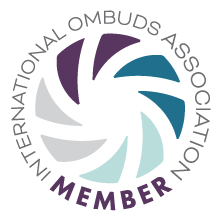What’s An Ombuds?
A no-barrier, first-stop resource for guidance, information & insight.
Accessible
Credible
Safe
Voluntary
Ombuds Definition:
Whether referred to as an Ombuds, Ombudswoman, Ombudsman, Ombudsperson, Ombud or other variation of the name, a commonly cited definition of an Organizational Ombuds is:
a designated neutral who is appointed or employed by an organization to facilitate the informal resolution of concerns of employees, managers, students and, sometimes, external clients of the organization.
[Source: CPER Journal No. 166 (June 2004)]
Types of Ombuds:
Just like there are many variations of the term Ombuds, there are also several types of Ombuds, each having their own unique area of specialization, duties, functions & focus.* These include:
- Organizational Ombuds
- Classical Ombuds
- a.k.a. Legislative Ombuds
- a.k.a. Executive Ombuds
- Advocate Ombuds
*Please Note: Ombuds.io provides Outsourced Organizational Ombuds services. Classical Ombuds are often appointed by governmental or legislative bodies. Advocate Ombuds are commonly found in healthcare.
It’s Not About Advice, It’s About Options!
Ombuds don’t give advice. Instead, they help visitors by helping them to help themselves. Ombuds empower individuals and organizations to overcome disputes, conflicts and barriers that stand in the way of reaching their full potential. Ombuds accomplish this by working with visitors to:
- better understand a situation from the visitors’ perspective
- clarify the visitors’ interests, challenges & goals
- examine the possible consequences of several courses of action

What Organizational Ombuds Do:
For Organizations & Leaders
- Monitor Trends
- Address Challenges
- Pressure-Test New Ideas
- Strengthen Relationships
- Analyze Risks
For Teams & Individuals
- Manage & Resolve Conflicts
- Clarify Appropriate Channels
- Identify Options
- Build Engagement
- Analyze Problems
What Organizational Ombuds Don’t Do:
- Receive official notice of claims against an organization
- Conduct investigations
- Make management decisions or policy
- Advocate or take sides
- Substitute for formal channels
- Testify or produce documents in legal or other proceedings
Common Issues Organizational Ombuds Address:
$359B
Estimated annual cost of unresolved workplace conflict in the United States.
[Source: CPP Global Human Capital Report, July 2008]
15%
Additional profits for organizations with highly engaged employees/volunteers.
[Source: MIT Sloan Management Review: Measuring the Benefits of Employee Engagement, Summer 2015]
$22
Savings/cost avoidance for every $1 invested in an Organizational Ombuds program.
[Source: John Zinsser; Jonathan E. McBride & James S. Hostetler, NACD-Directors Monthly, May 2008]
Ombuds.io is an active member of the International Ombuds Association (IOA). Ombuds services offered to Entertainment Industry studios, productions, projects & events through Ombuds.io follow the IOA Standards of Practice & Code of Ethics.
Ombuds.io Operating Principles:
CONFIDENTIALITY
Confidentiality is the defining characteristic of our Ombuds services. The identity of those seeking assistance from our Ombuds and all communications with them are confidential to the maximum extent permitted by law. Our Ombuds may, at their sole discretion, disclose confidential information when the person seeking assistance gives permission to do so; when failure to do so might result in an imminent risk of serious harm; or as necessary to defend against a formal complaint of professional misconduct.
INDEPENDENCE
Our Ombuds services are independent in structure, function, appearance, and decision-making. Our Ombuds report to the highest possible level within our client organizations and do not report to a function or entity that could affect, or be perceived as affecting, our Ombuds’ independence.
IMPARTIALITY
Our Ombuds are designated neutrals and impartial resources who do not take sides or serve as an advocate for any person or entity. Our Ombuds avoid conflicts of interest and conduct that could be perceived as a conflict of interest.
INFORMALITY
Our Ombuds do not participate in any evaluative, disciplinary, legal, or administrative proceedings related to concerns brought to the Ombuds’ attention. Our Ombuds are not authorized to make business and policy decisions or conduct formal investigations on behalf of our client organizations. Our Ombuds are not agents of client organizations for purposes of receiving notice of claims against the organization and are not authorized to be a formal reporting channel for the organization on matters brought to the Ombuds’ attention, except when specifically and expressly mandated by law.

